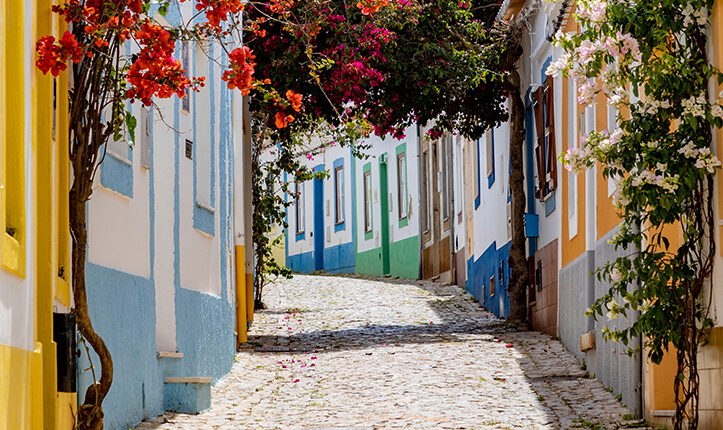There has been much speculation on how the name Ferragudo came about. Was it taken from the name of a mine in Castro Verde or of a fort in central-eastern Portugal, perhaps from a surname (Ferro Agudo)? The most likely explanation is a traditional one. Machines, made of iron, sat on the local beaches and were used to raise fish from the sea and boats to sell at market. This machinery was known as an engenho de ferro and it had many sharp, agudo, pieces to it. Hence ferro agudo (sharp iron).
In 1520 the village was officially recognised and protected by Queen D Leonor, which allowed it to flourish, but Ferragudo is in fact far older than the 500 years it is celebrating in 2020.
Sitting at the mouth of the Arade river’s estuary, Ferragudo offered shelter to the Romans, Carthaginians and Phoenicians amongst many. To this day its harbour is used by small boats throughout the year.
The village prospered with the fish-canning industry, giving most locals their income. Factories had creches for babies to allow women to work, whilst the men mostly laboured on the ships and in port. Across the river in Portimão, the city’s museum has been built in a fish-canning factory where visitors can follow, from the river itself, the process of deheading, cleaning, canning, cooking and finally labelling of tins that were then shipped abroad. Portuguese sardines were known the world over.
Now a bustling town with a market, many restaurants, cafés and bars Ferragudo is enjoyed by visitors throughout the year with tourism being its main industry. The climbing cobbled streets and the brightly-painted traditional houses offer those visiting not only a hard climb to the parish church overlooking the town, but also wonderful photographic opportunities.
Originally the 500 years’ celebratory programme was to include the arts, gastronomy, handicrafts and of course promotion of the town’s history however, with Covid-19 this was all put aside. Through the summer small events including live entertainment are being held, check out Ferragudo’s Facebook page and 365Algarve online (the Algarve tourism board’s events web site) for more information.
Click here for information on the area now, Ferragudo is well worth visiting on your next trip to Algarve.
Image: travelview | Shutterstock


I found this article on Google inspiring! expanded my culture i wanted to follow you on social media, how do i do it?.
Congratulations on the site, also know mine:
https://strelato.com
.
Hi Alexandre, we are on FB @algarveholidayletscompany and Instagram algarve_holiday_lets
Brilliant information here! Hopefully you wont stop the flow of such magical material!
Great thanks so much grateful for your help
GT road near the information contained in this case
Your writing style is cool and I have learned several just right stuff here. I can see how much effort you’ve poured in to come up with such informative posts. If you need more input about Website Design, feel free to check out my website at Webemail24